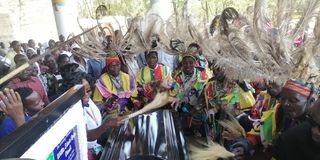Colourful rites planned for Ker Willis Otondi burial

Pomp and colour during public viewing of Luo council of elders Chairman Opiyo Otondi's body at Jaramogi Oginga Odinga Sports Complex on March 2, 2023.
Elaborate cultural rites have been lined up for the burial of the Luo Council of Elders chairman Ker Willis Otondi on Saturday.
The rituals will be performed according to the Luo culture, which has been documented in culturalist Paul Mboya’s book Luo Kitgi gi Timbegi, a handbook of Luo culture and traditions.
In the book, there is a section that elaborates on the rites performed when ‘Jaduong’ — an elderly person — dies.
Before he is lowered into the grave, Luo elders will lead the community, family, and friends in a ceremony filled with a series of rites that will ensure the Ker's life is celebrated while at the same time, the Luo culture is upheld.
The cultural rites were also adhered to on Thursday, when the body of the prominent Luo elder was taken to the Jaramogi Oginga Odinga Sports Complex at the heart of Kisumu city for public viewing.
While the crowd grew impatient for the body to be taken to his Nyahera home, the elders present maintained that the body would only be taken at sunset.
“The body of Mzee is not allowed to enter his home when the sun is still up, we have to wait until dusk so that we adhere to the traditions. What is happening here today is not by chance, but normal, according to Luo traditions, and we are doing it to preserve culture so that the young people can learn,” said an elder, Mr James Ayaga.
After viewing, the procession left slowly at 3pm for Pap Okore Kogondo for the second viewing, then to Nyahera, where it will arrive at around 5.30pm, before leaving for Otondi’s home.
According to Mr Odungi Randa, a member of the Luo Council of Elders, Friday morning will be purely for cultural rites at the home of Otondi before he is buried on Saturday.
“Some of the cultural rites synonymous with mourning a prominent person such as Tero Buru will be performed on this day, before we bury Mzee Otondi,” said Mr Randa.
Tero Buru is one of the Luo traditions performed at the funerals of an elderly person or prominent figure in the community before the body is taken to the grave for burial.
During the ceremony, elders and selected youths take cattle to the home of the deceased, which are driven crazily around the home.
Those involved in the ritual usually dress in traditional war regalia, which includes hides and sisal hats. They also carry twigs and they wear the famous akala rubber sandals made from used tyres.
They go around the home of the deceased, some holding the horns of the charged animals and run with them while singing dirges and chanting war songs.
The herd of cattle is then driven towards the nearest water body, where evil spirits are supposedly dispatched. This will be done for a distance of 10 kilometres from Kiboswa junction near the home, to where the Luos used to face the Kalenjin in battle.
It will involve elders alongside the famous Kochia-Kagan dancers from Homa Bay County.
Mr Jotham Ajiki Ondu said the rituals and activities, which will take five hours, will include plays in Dholuo, dances, and even traditional wrestling called Tuk Opiyo.
“We will perform rites from 9am including plays, presentations and dances called Miend winy, where we will have Kochia-Kagan dancers performing while donning hats made of ostrich feathers,” said Mr Ajiki, an elder.
He also stated that there will be traditional wrestling known in Luo as ‘amen’.
Mr Ajiki is known for his unique way of praising, as well as mourning, prominent Luo leaders usually referred to as Sigweya. Also known as Gweyo in reference to chanting done by individuals who also call out the name of the deceased, recalling the fond memories they have of them.
Then there is Padho — ‘sitting without doing nothing’. The close relatives of the deceased are expected to stay within his compound keeping vigil until the burial day on Saturday, which will be attended by guests and dignitaries, led by opposition chief Raila Odinga and elders from other communities.
However, the Church has warned the elders against ‘over-performing’ the traditions, saying as much as Otondi was a Luo elder, he was also a devout Christian.
The Reverend Tom Sidede, who is the administrative secretary of the African Inland Church, said the rites should not lean too much on the secular, leaving out the Christian side enjoyed by the late Ker.
“We do not oppose the rites performed, but they should not be too secular, because as much as he was an elder, Ker was a born-again Christian. Let us also avoid rites that have been overtaken by events,” said the Rev Sidede.
During the viewing, leaders called for the unity of the Luos, following the wrangling that has been witnessed over the past years over the leadership at the Luo Council of Elders.





